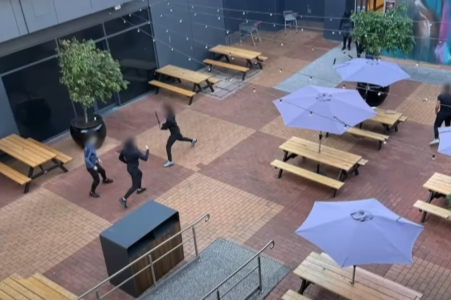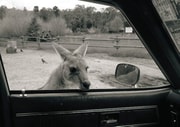Sudden ban hits everyday tools sparks confusion among hobbyists
By
- Replies 30
Suppose you’ve ever used a machete for gardening, camping, or even as a handy shed tool.
In that case, you might be in for a shock: One state has just announced a sweeping ban on the sale of all machetes across the state following a violent brawl at a shopping centre that left the community rattled.
Premier Jacinta Allan announced that from noon on Wednesday, 28 May, until 1 September, it will be illegal to sell machetes anywhere in Victoria—no exceptions.
This is a significant move, and many people, especially those who use these tools for legitimate purposes, are wondering what it means for them.
The decision comes hot on the heels of a disturbing incident over the weekend, where a group of allegedly armed individuals clashed in a public shopping centre.
The footage and reports from the scene were enough to prompt immediate action from the state government, who are determined to get these 'dangerous weapons' off the streets.
'These knives are dangerous weapons, they have no place on our streets anywhere,' Premier Allan said.
She emphasised that the ban is a direct response to growing concerns about public safety and the misuse of large knives in violent incidents.
The government’s definition of a 'machete' is specific: any cutting-edge knife with a blade over 20cm.
Importantly, this does *not* include kitchen knives that are primarily used for food preparation—so your chef’s knife is safe (for now).
But if you’ve got a machete in the garage or shed, it’s time to take note.
Under Australian consumer law, such bans can only be put in place on an interim basis.
This particular sales ban will run until 1 September, when Victoria will introduce an Australia-first, statewide ban on the possession of machetes.
That’s right—after September 1, simply owning a machete could land you in hot water unless you fall under a specific exemption.
September will also mark the start of an amnesty period, allowing Victorians to hand in their machetes without penalty.
The government is urging retailers to store any excess stock securely until the amnesty and disposal schemes kick in.
Retailers are being told to lock away any unsold machetes until the new rules come into effect.
If you’re a collector or someone who uses machetes for work or hobbies, you’ll need to keep an eye out for details on the upcoming exception schemes.
The government has promised more information closer to September.
Consumer Affairs Minister Nick Staikos has warned that a special task force will be checking up on businesses to make sure they’re following the rules.
Non-compliance isn’t just a slap on the wrist—penalties could include fines of over $200,000 and even jail time.
For most of us, machetes aren’t an everyday item, but for some—especially those in rural areas, gardeners, or outdoor enthusiasts—they’re a useful tool.
The government says the ban is necessary to keep communities safe, but it’s sure to cause some headaches for people who use machetes responsibly.
If you have a machete at home, don’t panic just yet. The possession ban doesn’t start until 1 September, and there will be an amnesty period to hand them in.
Keep an eye out for more details from the government about how to safely dispose of or register your machete if you believe you have a legitimate reason to keep it.
This move by Victoria is part of a broader national conversation about knife crime and public safety.
Other states have introduced restrictions on certain types of knives, but Victoria’s total ban on selling and possessing machetes is a first for Australia.
It’s a sign of how seriously authorities are taking the issue, especially in the wake of high-profile violent incidents.
In similar news, Coles will stop selling kitchen knives across Australia after a teenager allegedly stabbed a 63-year-old worker in Queensland.
In response to the incident, the supermarket confirmed it would remove all kitchen knives from sale nationwide. You can read more about it here.
Credit: YouTube

What do you think about Victoria’s machete ban? Do you use a machete for gardening, camping, or work? Do you think this will make our streets safer, or is it an overreaction? We’d love to hear your thoughts and experiences—share your comments below.
In that case, you might be in for a shock: One state has just announced a sweeping ban on the sale of all machetes across the state following a violent brawl at a shopping centre that left the community rattled.
Premier Jacinta Allan announced that from noon on Wednesday, 28 May, until 1 September, it will be illegal to sell machetes anywhere in Victoria—no exceptions.
This is a significant move, and many people, especially those who use these tools for legitimate purposes, are wondering what it means for them.
The decision comes hot on the heels of a disturbing incident over the weekend, where a group of allegedly armed individuals clashed in a public shopping centre.
The footage and reports from the scene were enough to prompt immediate action from the state government, who are determined to get these 'dangerous weapons' off the streets.
'These knives are dangerous weapons, they have no place on our streets anywhere,' Premier Allan said.
She emphasised that the ban is a direct response to growing concerns about public safety and the misuse of large knives in violent incidents.
The government’s definition of a 'machete' is specific: any cutting-edge knife with a blade over 20cm.
Importantly, this does *not* include kitchen knives that are primarily used for food preparation—so your chef’s knife is safe (for now).
But if you’ve got a machete in the garage or shed, it’s time to take note.
Under Australian consumer law, such bans can only be put in place on an interim basis.
This particular sales ban will run until 1 September, when Victoria will introduce an Australia-first, statewide ban on the possession of machetes.
That’s right—after September 1, simply owning a machete could land you in hot water unless you fall under a specific exemption.
September will also mark the start of an amnesty period, allowing Victorians to hand in their machetes without penalty.
Retailers are being told to lock away any unsold machetes until the new rules come into effect.
If you’re a collector or someone who uses machetes for work or hobbies, you’ll need to keep an eye out for details on the upcoming exception schemes.
The government has promised more information closer to September.
Consumer Affairs Minister Nick Staikos has warned that a special task force will be checking up on businesses to make sure they’re following the rules.
Non-compliance isn’t just a slap on the wrist—penalties could include fines of over $200,000 and even jail time.
The government says the ban is necessary to keep communities safe, but it’s sure to cause some headaches for people who use machetes responsibly.
If you have a machete at home, don’t panic just yet. The possession ban doesn’t start until 1 September, and there will be an amnesty period to hand them in.
Keep an eye out for more details from the government about how to safely dispose of or register your machete if you believe you have a legitimate reason to keep it.
This move by Victoria is part of a broader national conversation about knife crime and public safety.
It’s a sign of how seriously authorities are taking the issue, especially in the wake of high-profile violent incidents.
In similar news, Coles will stop selling kitchen knives across Australia after a teenager allegedly stabbed a 63-year-old worker in Queensland.
In response to the incident, the supermarket confirmed it would remove all kitchen knives from sale nationwide. You can read more about it here.
Credit: YouTube
Key Takeaways
- Victoria will ban the sale of all machetes statewide from midday Wednesday, 28 May, until 1 September, following a violent shopping centre brawl.
- The temporary sales ban is a step towards Victoria’s upcoming total machete possession ban, beginning with an amnesty period starting 1 September.
- The ban applies to any cutting-edge knife with a blade longer than 20cm, except those primarily used in kitchens.
- Retailers must securely store unsold machete stock, and a task force will ensure compliance, with penalties for breaches, including hefty fines and possible jail time.








